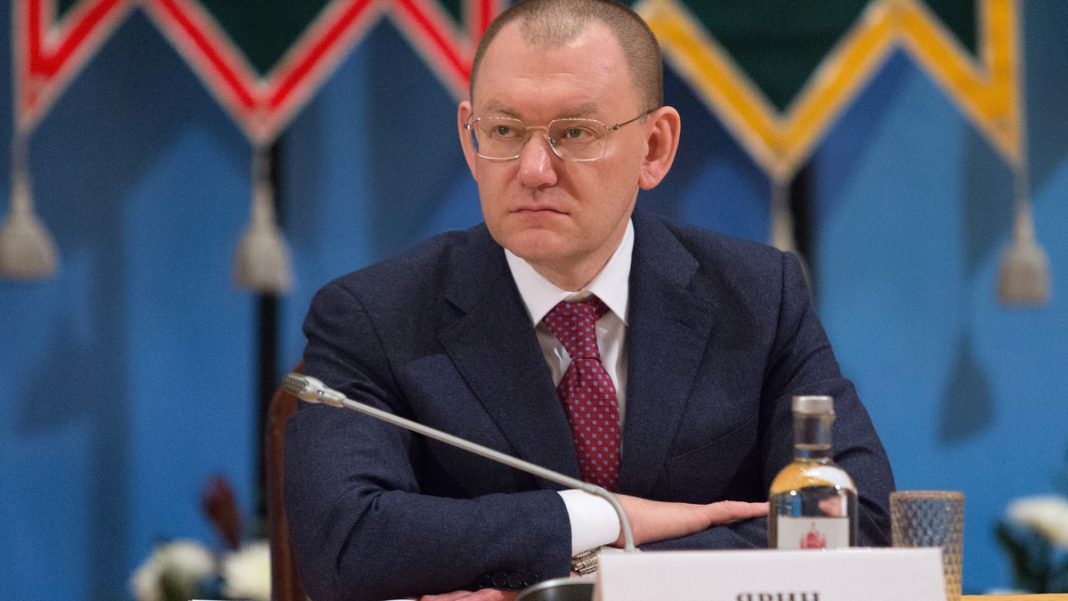Andrey Veniaminovich Yarin was born on September 13, 1970, in Nizhny Tagil in a family of a worker. His father, Veniamin Alexandrovich Yarin (1940 – 2011), became famous during the years of perestroika, initiated by the President of the USSR Mikhail Gorbachev. He was a delegate to the XIX Party Conference and was later elected as a deputy of the Supreme Council of the USSR. For some period he was a member of the opposition United Front of Workers, but in 1991 he was expelled due to support for Gorbachev’s economic program. Veniamin Alexandrovich was also a member of the Presidential Council under M. Gorbachev.
After graduating from school in 1987, Andrey entered the Faculty of Economics of Moscow State University named after Mikhail Lomonosov, which he graduated in 1992. During 1992-1993, right after graduation, he worked as an economist in the credit department of the Moscow commercial bank “Discount”. From 1993 to 1995, he was a deputy and then a head of the credit department of the bank. Later, “Discount Bank” was considered as a bank used by FSB for transferring large amounts abroad. In 2006, the bank was closed, a criminal case was initiated, and the future head of the FSB, Alexander Bortnikov, was among those suspected of corruption in this case. In 2007, The New Times wrote: “According to [our] sources in the Ministry of Internal Affairs, who agreed to provide information solely on the condition of anonymity, we are dealing with criminal case No. 248089, started on September 8, 2006, following the results of an audit performed by the Department of Economic Security of the Ministry of Internal Affairs of Russia”, against unidentified persons among the employees of the “Bank Discount” (LLC) on the grounds of crimes under Art. 173 and paragraph “a” part 3 of Art. 174 of the Criminal Code of the Russian Federation. These articles refer to the establishment of fake companies without the intention to carry out entrepreneurial activities (Article 173) and the laundering of money or other property acquired by other persons in a criminal way (Article 174). According to the Ministry of Internal Affairs, the audit discovered a scheme of money withdrawal, led by officials, who are close to Kremlin-controlled oil companies and Lieutenant General Alexander Bortnikov, deputy director of the FSB and head of the FSB’s economic security department. Bortnikov is known for his close relationship with the deputy head of the Presidential Administration, Igor Sechin, and Vladimir Putin’s aide, Viktor Ivanov. According to The New Times sources, Bortnikov allegedly oversaw the outflow of money from various commercial structures involved in the sale of electronics in Russia.
This Content Is Only For Subscribers
According to media reports, the Austrian Raiffeisenbank was involved in the schemes offered by Discount.
In 1995, Andrey Yarin became the chairman of the board of Vneshagrobank JSCB, created by businessman Ilya Khaikin. Khaikin himself headed the supervisory board of Vneshagrobank and joined the board of directors of Discount Bank. This means that in the 90s, Yarin was Khaikin’s man.
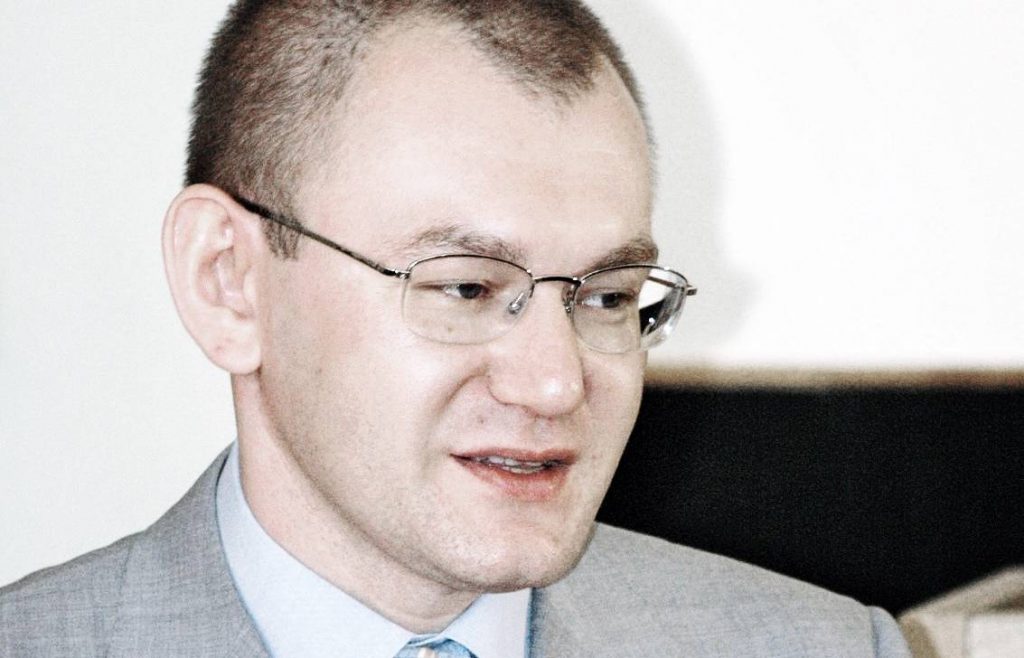
In 2007, Khaikin, who was characterised as “the holder of compromising evidence on the Russian elite”, escaped Russia to the UK and was put on the international wanted list on charges of organizing a criminal group aiming of seizing land in the Moscow region. In 2013, Khaikin was detained in Spain and even nearly extradited to the Russian authorities. However, after spending several months in a Spanish prison, Khaikin was released.
Yarin had quite close connections with Khaykin. Both of them were managing their shares in “Arbat-Avto Group” LLC in 2002-2003. The company also owned a stake in the commercial bank “Discount” (where Yarin began his career, having settled in the bank immediately after graduating from Moscow State University).
As it turned out, Yarin also had his share in another well-known Khaikin asset, a joint-stock company “Badaevsky Brewery”. He continued to receive income from the organization, even being a civil servant. Whether Yarin owns shares now is unknown, the company does not disclose the list of its beneficiaries.
Badaevsky, control over which was transferred from Khaikin to Capital Group (led by Pavel Tyo), owns former factory buildings and land on the Taras Shevchenko embankment in Moscow. Capital Group, which is patronized by the authorities, plans to build an elite residential complex on this site, but the project faced resistance from locals. According to Russian CSO Arkhnadzor, the brewery, which is a monument of industrial architecture, experiencing a risk of losing its identity completely.
In the late 90s, the Ministry of Internal Affairs checked Yarin’s connection with a suspect in a double murder. “On 26th March 1998 corpses of Orekhov V.I. with multiple bullet wounds and citizen Daoud Mohammad with a gunshot wound were founded in the sports hall located in the hotel complex “Berlin”. Savosich N. O. is suspected of committing this crime,” the report says. Andrei Yarin’s phone number ended up in Savosich’s notebook. It was also established that the suspect Savosich was in close contact with the driver of Yarin’s wife.
This is not the only mention of Yarin in the police file. In 2012, he was put on a special account in the Moscow region. “Developed; as part of the events,” the police base says. There are no other details.
Yarin had land in the Moscow region at the beginning of the 2000s. He owned 14 acres in Zhukovka (the “Tsarskoye Selo” cottage village). Before entering the civil service, Yarin sold this site. In 2004, it was owned by Arant LLC, registered in Ryazan and established by Deverell Global, a US company.
In 2001-2002, he was a Deputy Head of the Administration of the Vladimir Region, and a Head of the Representative Office of the Vladimir Region under the Government of Russia (under Governor Nikolai Vinogradov). Then – a Deputy Head of the Financial and Economic Department of the Federal Migration Service (FMS) of the Ministry of Internal Affairs of Russia.
In December 2002 – March 2003 – a First Deputy Chairman of the Government of the Chechen Republic (under Prime Minister M. V. Babich, and left the government after Babich resigned from the position of Prime Minister). In November 2003 – April 2004, a Deputy Head of the Financial and Economic Department of the Federal Drug Control Service of Russia.
In April 2004 – April 2005 he was serving as the Vice Governor and Chairman of the Government of the Ryazan Region. “There he worked with the governor Georgy Shpak, who was promoted by Mikhail Babich, and in Moscow, he was supported by Dmitry Rogozin. Yarin managed to fit into this structure,” says political scientist Rostislav Turovsky. During these duties, he had a conflict with the governor, and his retirement is often associated. According to public information, Shpak (a former colonel general, and former commander of the Airborne Forces of the Russian Federation), being a flammable person, hit Yarin with a chair during one of their quarrels.
From April 2005 until June 2006, Yarin served as a Deputy Head of the Department of Internal Policy of the Office of the Plenipotentiary Representative of the President of Russia in the Southern Federal District (again in a team with Babich).
From June 2006 to August 2009 he was a Chairman of the Kabardino-Balkarian Government. He was considered a protege of the presidential envoy to the Southern Federal District Dmitriy Kozak (who also patronised Babich).
Since 2009 he was the chief adviser, and later, in 2009-2012 – the head of the apparatus of A. D. Beglov, the deputy head of the Presidential Administration of the Russian Federation. The “Kommersant” magazine wrote: “Since 2009, Mr Yarin worked in the team of Alexander Beglov: first, in the , and since 2012, was his deputy in the Central Federal District. There he was in charge of domestic politics. The plenipotentiary’s office stated that Mr Beglov “relies on the creativity of his subordinates” when forming a team. At the same time, Mr Yarin, who served as the executive secretary of the Presidential Council for Cossack Matters (also headed by Alexander Beglov), was charged by the Cossacks for showing a “bureaucratic approach” in respect of their activities.
During the municipal elections in St. Petersburg which took place on September 14, 2014, Yarin “distinguished himself”: he was accused that many candidates were not allowed to submit their documents as a result of his actions. According to Ruspres, it was Yarin, who oversaw this scandalous campaign, carrying weekly meetings with local authorities.
In 2012-2016 Yarin was the Deputy of A. D. Beglov, the Plenipotentiary Representative of the President of the Russian Federation in the Central Federal District
In October 22, 2016, he started as the Head of the Office of the President of Russia for Internal Policy.
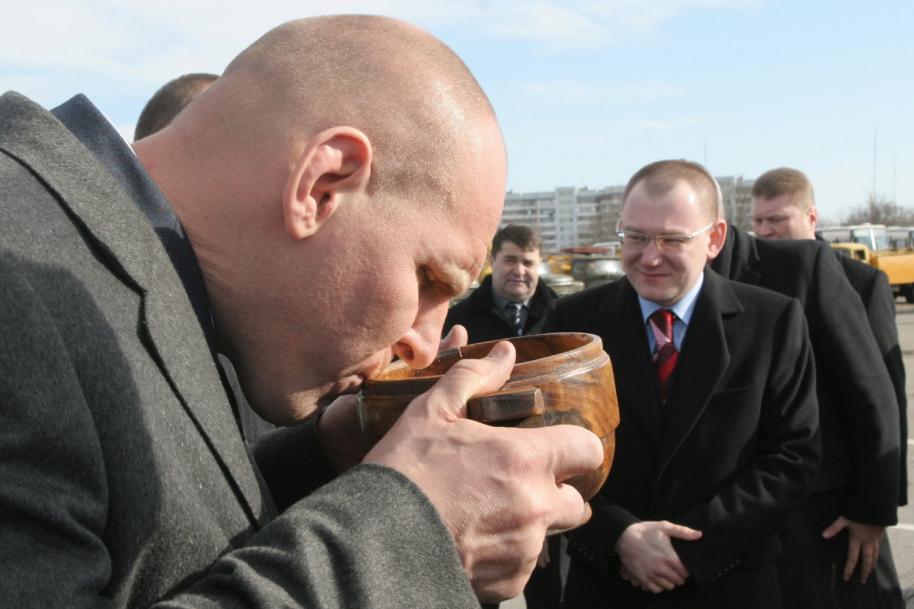
Yarin’s appearance in the Presidential Administration was actively discussed in the Russian media. There were several theories about his promotion to such a significant position. Some experts believed that this appointment was lobbied by Beglov, noticing Yarin’s proficiency in finding a common language and interaction with regional elites. Others believed that Beglov’s lobbying capabilities would be definitely not enough and in this case, Yarin’s appointment should have been accepted by such heavyweights as the Kovalchuk brothers and Sergei Chemezov, the head of Rostech. Other theories assumed that the choice in favour of Yarin was influenced by Anton Fedorov, the head of the Russian Presidential Department for Civil Service and Human Resources, who served as a Deputy Plenipotentiary Representative in the Central Federal District since 2000, then moved to Rosatom, after which he started leading a department in the Presidential Administration in 2013.
Yarin had to face the removal of Volodin’s associates, those who were invited into the Administration by Vyacheslav Volodin. As a head of the Internal Policy Department, Yarin took place of Volodin’s protege Tatyana Voronova (who headed the Office of the State Duma of the Federal Assembly of the Russian Federation after transferring her duties to Yarin, and in March 2021 Tatyana Gennadievna received C-level position in “Novatek”). Alexander Kharichev, whom Sergey Kiriyenko was actively trying to promote to this post, was a main competitor of Yarin as a head of the Internal Policy Department. This led to a decision taken that while Yarin heads the Department, Kharichev becomes his first deputy.
According to available information, Yarin immediately got his bearings and hurried to show his loyalty to Sergei Kiriyenko. At least Yarin made it clear to Kiriyenko that he was not his enemy. Despite never being a «Kiriyenko’s man», and latest does not tolerate «foreigners», they managed to work together.
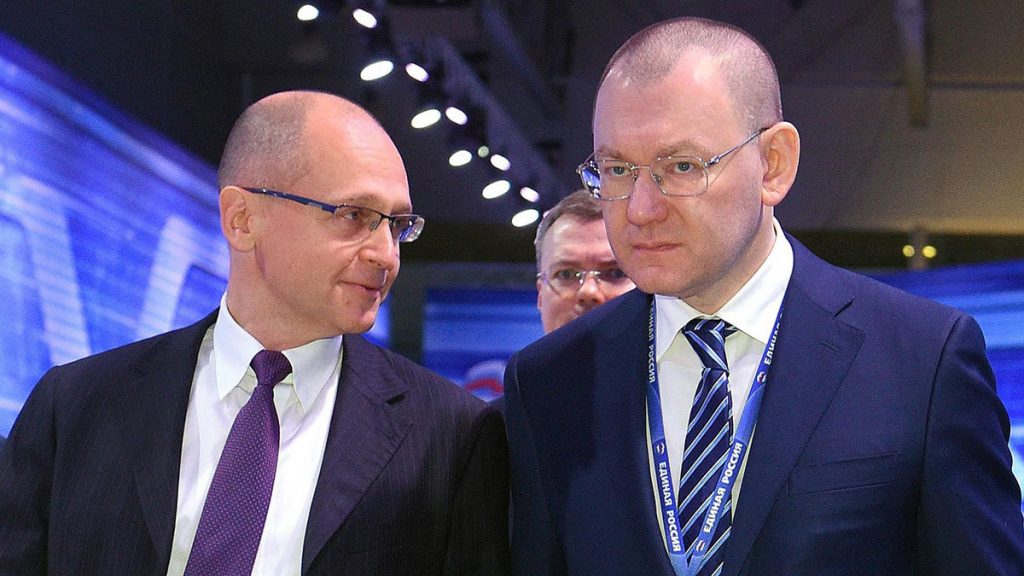
«Secrets of the Kremlin», the Telegram channel, describes Yarin as follows: «Andrey Yarin, the head of the Presidential Department for domestic policy, is a shady but a very influential figure. Election campaigns are carried out all over the country and the future of regional leaders is being decided with his “operational support».
In 2018, Yarin steered the campaign headquarters of Vladimir Putin in the Presidential Elections, despite Sergei Kiriyenko being the real head of the headquarters being truly engaged in organizational and technological matters.
In 2018, Alexander Shestun, the former head of the Serpukhov District, published a video message with a story about threats from Andrei Vorobyov, the head of the Moscow Region, allegedly because of a rally against the “Lesnaya” trashyard. In another video, Shestun published recordings of a conversation with Yarin, who forced him to resign. According to Shestun, Yarin and his colleagues “literally threatened me: either you write a notice or we will put you in jail; we will seize your house, and drain you and your five children (four were minors at that time) dry.” The record shows that Yarin told Shestun: “Either you write a statement, or we will bring you to nought and kill…” After the recordings were published, Yarin was charged for incomplete official compliance, but there was no further investigation because the problem for the Kremlin was not in the format of relations between the Presidential Administration and regional authorities but in its publicity. Shortly, they came to Shestun with an investigation and arrested him.
The oppositional website “Putin’s List” describes Yarin as follows: “Yarin is considered an executive and tough bureaucrat, a technocrat. His work in the Department of Internal Policy expresses the Kremlin’s request for more significant manufacturability and explicit implementation of the president’s direct orders, and firstly, this influences securing the procedure and results of elections that are beneficial for the Kremlin at different levels. Increasing dissatisfaction with the “Edinaya Rossiya” party and associated politicians is the most crucial internal problem for the authorities. Therefore, it is not surprising that Moscow is sending a person to instruct the regional and municipal authorities. Therefore, at the beginning of 2019, Andrei Yarin and Andrei Turchak, the Secretary of the General Council of the “Edinaya Rossiya”, had a series of meetings with the heads of the most unsettled municipal councils and district administrations – firstly in Smolny, later – in the office of the Presidential Plenipotentiary Representation in the North-West Federal District in St. Petersburg, Gubernatorial and municipal elections were scheduled in Putin’s hometown in September 2019, so neither the second round nor the defeat of the governmental candidate here was appropriate for the Kremlin. Thus, the Department of Internal Policy was requested to “ensure” the result of pro-government candidates strictly to the municipal level. As far as a lot of scandals regarding removing of the majority of independent candidates from the elections took place, this strategy was chosen”.
According to Meduza, Andrey Yarin was the person behind hacking the Anti-Corruption Foundation’s corporate e-mail, when several hundred thousand email addresses of Alexei Navalny’s supporters fell into the attacker’s hands.
On October 15, 2020, the EU and the UK imposed sanctions on Yarin for an assassination attempt made on an opposition politician Aleksey Navalny using a chemical weapon. The sanctions include a ban on entering the EU and financial transactions, as well as freezing assets.
“Andrei Yarin was assigned to the Presidential Administration’s task force, whose purpose was to counter Aleksey Navalny’s influence in Russian society, including operations aimed at his discrediting. The poisoning of Navalny was possible only with the consent given by the Presidential Administration. Because of his supervision, Andrei Yarin is responsible for initiating and supporting those who performed or were involved in the poisoning of Aleksey Navalny using the “Novichok” nerve agent, which usage is, according to the Chemical Weapons Convention, considered as usage of chemical weapons” – the EU comments.
After the 2021 parliamentary elections, Yarin confirmed his effectiveness in overseeing the conduction of election campaigns, including the formation and supervision of campaign networks. This task was fully assigned to him and Alexander Kharichev. Excellence in the elections allowed Yarin to strengthen his position in Sergei Kiriyenko’s team and to continue leading the Presidential Department of Internal Policy.
In 2022, Yarin started being actively engaged in establishing political strategies in the occupied territories of southeast Ukraine, but later the task was re-assigned to Alexander Kharichev. This increased competition between the two officials within Kiriyenko’s inner circle again. According to open information, Dmitry Rogozin, the ex-head of Roskosmos, is expected to become the Plenipotentiary Representative in a new federal district, formed on the territories of so-called “Luhansk People’s Republic” and “Donetsk People’s Republic” breakaway states and other occupied Ukrainian territories, will deal with the further fate of the occupied territories. Most likely that he will receive a vice-premier prefix to his title. Currently, only Yuri Trutnev, the Presidential Representative in the Far Eastern District, has such a prefix in his title.
As of mid-July 2022, it became known that Alexander Kharichev started the gradual transfer of all Ukrainian matters to Yarin, at the same time being prepared to return to domestic politics and preparations for the upcoming Russian election campaigns. Boris Rapoportov also returned to internal election affairs. Apparently, Andrei Yarin made a bet on rapprochement with Dmitry Rogozin and to become a ground of a new team or even a new political clan surrounded by the president if Rogozin will be appointed to the Presidential Administration or assigned to overseeing political procedures in the occupied territories.
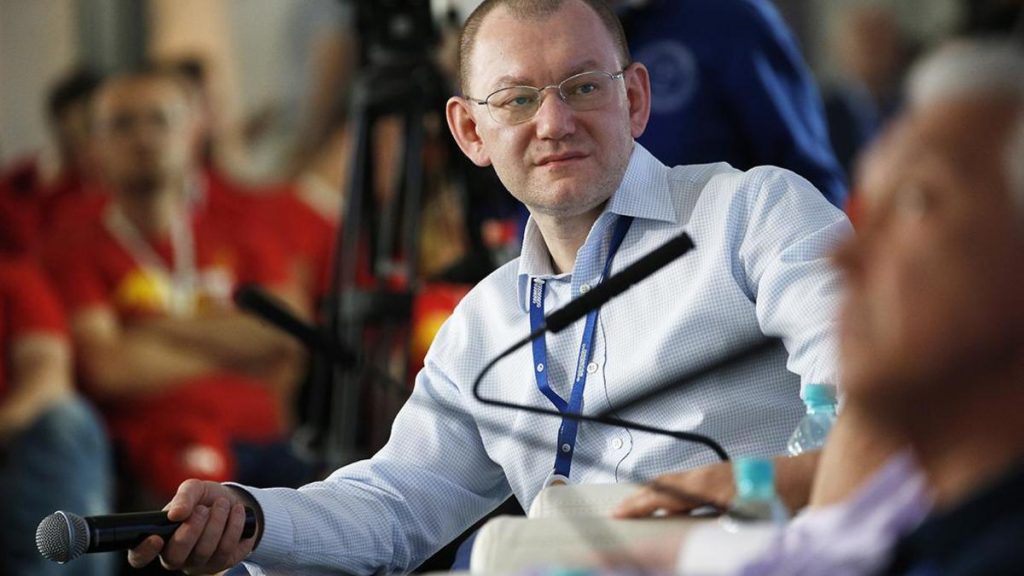
In November 2023, the Russian journal RBC, citing several sources in the Kremlin, stated that Andrei Yarin headed the official election headquarters of Vladimir Putin in the upcoming elections. However, it is essential to note that as of November, Putin himself has yet to officially announce his candidacy for the forthcoming elections, which has already given rise to many theories and assumptions. In this case, it is more appropriate to note that Andrei Yarin will lead the election headquarters of the Kremlin candidate (even if a decision is made to nominate a new candidate instead of Putin).
It is important to note that in the previous presidential elections, Vladimir Putin’s headquarters was headed by Sergei Kiriyenko. Yarin is considered a person from Kiriyenko’s team, which, in turn, means: a) Kiriyenko will continue to remain the actual head of staff, and b) Yarin can expect rapid career growth. Yarin is a tough manager who knows how to “break through the knee.” In fact, for a long time, he was one of the primary supervisors of domestic policy in the Russian Federation. Therefore, the main emphasis will be not on technology (Kiriyenko’s methods) but on mobilising the federal districts’ vertical chain of governors and presidential representatives. In conditions where the headquarters will be led by Yarin, the success of not only Putin can be guaranteed, but also any person whom Putin points to (if, at the last moment, he decides to find a successor for himself).
At the same time, according to available information, the shadow election headquarters should be headed (or has already been led) by the head of the Office of the President of the Russian Federation to ensure the activities of the State Council, Alexander Kharichev. Like Yarin, Kharichev is Kiriyenko’s man and has enormous experience in successful election campaigns (Ascolta wrote more about him here). Kharichev may be responsible for technology and all the “black” affairs that should not be entrusted to the main headquarters.
According to his declaration, during being in governance, Yarin did not earn a lot. He does not either a car or even an apartment while everything belongs to his wife. She was not publicly named, but it was possible to discover that her name is Chizhikova Alla Vladimirovna. She was born in 1968 in the city of Kaliningrad (nowadays Korolev), Moscow Region.
Chizhikova owns a 194.5 sq. m apartment (Yarin indicated usage of this property). It is located in the Khamovniki suburb, next to the “Park Kultury” metro station, located at the address: 16/12 Burdenko Str. It has a market value of about $1 mln.
According to Chizhikova’s documents, she rents an apartment to Alexander Sergeevich Bogachev. Bogachev is a personal driver of the family. Bogachev drives a Mercedes-Benz GLS 350 d 4matic (license plate V307NE 197), owned by Yarin’s wife.
Yarin speaks English and Italian. He is fond of tennis, football, yachting and diving, and also collects vinyl records.

